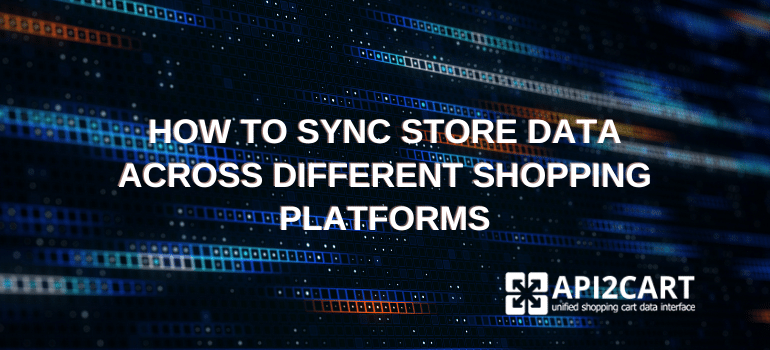
B2B eCommerce software has revolutionized the way the eCommerce industry operates across the globe. From inventory management to product information management, order management, warehouse management, shipping management, and more - these systems have made handling eCommerce operations an easy affair.
For performing these functions, such systems have to develop eCommerce integration that allows them to access store data such as products, customers, orders, categories, etc. Such information helps the software perform key features like updating inventories, managing stock, orders, and warehouse, handling shipment and delivery.
One of the main and quite challenging tasks for B2B SaaS companies is to sync store data across multiple sales channels. This article will tell you how you can easily synchronize and manage store info through one unified API.
What Store Data do B2B SaaS Systems Need to Sync?
There are various B2B SaaS systems across the eCommerce industry that need to sync store data from shopping platforms. They all need these data in order to perform one or the other function. Some of those systems are listed here, along with what store data is required to operate each one of them.
PIM Systems
Product Information Management Systems need to sync data related to products such as images, attributes, and other details to perform its core functions.
Since your system’s functionality is bound to work on integration with shopping carts, here is what the integration with eCommerce platforms allows your software to do:
Import product lists from retailers’ e-shops containing product prices, images, attributes, descriptions, variants, categories, and other information
Send product information to shopping carts’ and marketplaces’ listings
Add and update product and customer information on web stores
Mobile App Builders
For eCommerce mobile app builder synchronization of store data is significantly important. The data related to orders, products, customers, categories, and other information have to be synchronized on all sales channels.
Here are a few functions provided by mobile apps as a result of shopping cart integration:
Convert the web stores into mobile apps for a seamless remote operation
Sync product lists with information like prices, image descriptions, etc. along with other store information
Sync real-time orders on the app using webhooks
POS Systems
Point of Sale Systems need to sync important data related to orders and products to carry out their core functions without any disruptions. eCommerce integration will help such software operate in the following way:
Import order from multiple sales channels
Sync inventory across different eCommerce platforms
Retrieve, add, and update product lists
Import customer lists from various platforms
Organize the retrieved data in detailed reports
However, there are some pitfalls associated with B2B software integration with eCommerce platforms.
eCommerce Integration Challenges
Although integration is a must-have feature for B2B software to work seamlessly, developing such integrations is challenging. The problems multiply with the number of integrations required. Take a look.
Integrations are complex
It is not a go-to code that you will get anywhere. Integrations involve and work on specific architectures and workflows. Each of them is bound to perform a different set of tasks, and hence, require a different approach during development.
Integrations need advanced developers
Your in-house development team is not enough to establish integration between your B2B SaaS applications and shopping carts. The complexity and functionality involved in integrations can only be handled by skilled developers - the people who are expert at coding integrations.
Integrations are time-consuming
Keeping in mind the complexity of each integration, you can determine the time required to develop even one of them. It’s almost 8 weeks. You can imagine how long it will take to establish each integration.
Integrations are costly
Considering the processes involved in developing the integration and its use cases, it is not tough to determine each integration cost - about $6000 - $7000. Not only this, you need to build a separate infrastructure to develop these integrations in-house. Just multiply it with the number of integrations you require and you will get the annual expenditure estimate.
Integrations need maintenance and updates
Integration is a dynamic process and not a one-time thing. Along with shopping carts and marketplaces updating to their newer versions, integrations also need to be updated accordingly. If left to their previous versions, it can lead to inaccuracies. Further, integrations need consistent maintenance to keep the software running efficiently throughout its lifecycle.
How to Sync Different Store Data via Only One API?
There is a way to overcome all the challenges associated with integration with eCommerce platforms.
API2Cart helps you establish seamless integration between your B2B eCommerce software and more than 40 eCommerce platforms including Shopify, PrestaShop, BigCommerce, Magento, WooCommerce, OpenCart, as well as many others. You will be able to sync store data across different sales channels and retrieve and manage all sorts of store information.
Regarding store data synchronization, API2Cart provides the following methods:
product.add - for adding products to the store
product.update - for updating price and quantity for a specific product
order.add - for adding orders
order.update - for updating existing orders that were made by customers
customer.add - for adding customers to the store
customer.update - for updating customers’ information in the store
category.add - for adding categories to the store
category.update - for updating categories in the store
The above-mentioned methods can help you to sync store data across different eCommerce platforms. API2Cart provides you with well-defined docs to use these methods, a dedicated, tech-savvy 24/7 support team is always ready to help with any matters. API2Cart protects clients’ personal and store information from unauthorized access, so their customers can be assured about their data security.
Also, it takes care of all the upgrades and maintenance required throughout the integration lifecycle. So, you don’t need to worry when a shopping cart or marketplace releases a new version.
If you want to know more about how API2Cart works for your B2B software, get a free trial for 14 days. Get in touch with our experts to book a consultation call and discuss the gamut of opportunities for your business today.



